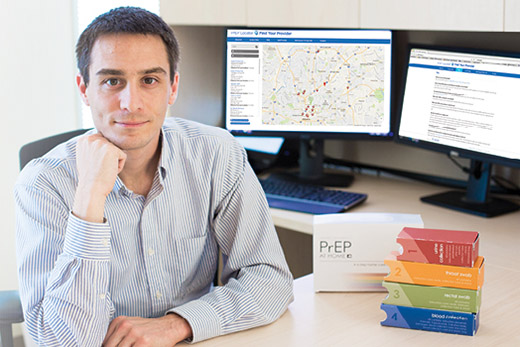By now, many people who are at risk for contracting HIV have heard of PrEP. They know pre-exposure prophylaxis is extremely effective in preventing the spread of the virus. What they often don't know is where to get it or how to navigate the insurance paperwork to pay for it.
Aaron Siegler has just made that job easier. A research assistant professor in epidemiology at Rollins School of Public Health, Siegler developed the PrEP Locator, the first national database of clinics that prescribe PrEP.
"PrEP has the potential to substantially reduce the number of new HIV infections in the United States, but only if people know how and where to get it," says Siegler.
Under the brand name Truvada, PrEP was approved by the Food & Drug Administration in 2012. Across several studies, men who have sex with men (MSM) who took the medication as prescribed—and thus had protective levels in their bloodstream—experienced an estimated 99 percent decrease in HIV transmission rates. The drug also protects women who are in a partnership with HIV-positive men and IV drug users who share needles.
The reasons many find it difficult to find a PrEP provider are varied. Stigma and judgment often play a role. Primary care physicians, while very familiar with treating diabetes and hypertension, do not generally deal with sexual health. And some doctors may not want to take on the workload required with a PrEP patient. Both the CDC and WHO recommend quarterly follow-up visits, including HIV and STD testing for people taking PrEP.
Whatever the reason, finding someone willing to prescribe PrEP was a roadblock for many. Funded by the MAC AIDS Fund, Siegler and his team gathered information from local and state governments, community organizations, and PleasePrEPMe.org, a California provider directory. They then verified the medical licensure of each provider.
In September, the PrEP Locator launched with more than 1,200 providers. Siegler also made it possible for other organizations to easily add the PrEP Locator to their sites.
When a user logs on, the website determines his location and a map pops up with nearby providers and their contact information. The database is also searchable by zip code. Users can upload information about a provider that is not included on the list, and Siegler's team will vet and add it. Since its launch, 35,000 people have used the site, and more than 300 providers have added themselves to the database.
For Rick Perera, an Atlanta man who has been on PrEP for three years, the locator's ability to identify which providers have PrEP navigators—people who can help clients through the labyrinth of insurance forms, financial assistance forms, and other related paperwork—is especially valuable. "It is a lot to take on," says Perera. "In addition to the medication itself, you have quarterly office visits and testing. Insurance might pay for some or all of it. Financial assistance is available. But wading through all the paperwork that is required can be very hard. Being able to find a PrEP navigator is a tremendous service."
But what if you live in an area that simply does not have a PrEP provider? Siegler worked with Patrick Sullivan, Charles Howard Candler Professor of Epidemiology, to develop a PrEP@Home kit that allows users to test themselves for HIV and STDs in their home. Their idea was for people who are already on PrEP to use the kit for maintenance, eliminating the need to visit the doctor quarterly. Siegler wants to see if the kit can be used to start people on PrEP in underserved rural areas.
PrEP@Home comes in bento boxes, with supplies, illustrated instructions, and an instructional video to allow the user to collect a urine sample, throat and rectal swabs, and a blood sample via a finger stick.
"We worked very hard tweaking the kit and instructions to make sure they were as easy as possible to use," says Siegler.
Sullivan's and Siegler's team have done a good job. Of the 58 men recruited to test the kit for maintenance, all but three have successfully returned the kit and had their prescription refilled by their providers. Two who did not comply could not bring themselves to stick their fingers, and one patient was lost to follow-up.
Now Siegler is using PrEP@Home in a telemedicine pilot project in rural Georgia and Mississippi to see if PrEP can be prescribed remotely to eligible young, black MSM. Participants will receive the home testing kit and a behavioral survey. Siegler's group will do the lab tests and provide the results along with the behavioral survey to a clinician, who will then have a telemedicine visit with the participant. If everything goes smoothly, the clinician will be able to prescribe PrEP without the patient ever having to leave his home.
"PrEP is such an important tool in addressing the HIV epidemic in our country," says Siegler. "It has the potential to really turn things around. So we'll keep working to find ways to get it to everyone who needs it."

